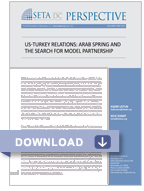US-Turkey relations in 2011 were in stark contrast to the “troubled” year of 2010. Policy debates in 2010 focused on the political and diplomatic fallout from the Mavi Marmara incident and Turkey’s “No” vote against the UN Security Council resolution on Iran. Policymakers in Washington called into question Turkey’s foreign policy direction and the intentions of its leadership. Extrication of the Turkish-Israeli relationship from the US-Turkey relationship represented a structural change. As the two sides were seeking ways to adjust to the new reality, the historic transformations sweeping the Middle East in 2011 created a new dynamic in the bilateral relationship. Creation of a special personal rapport between President Obama and Prime Minister Erdoğan was critical for the leadership on both sides to recognize once again that their countries’ relationship needed strengthening. Notwithstanding the differences on a variety of issues, the move toward forging a “model partnership” has begun.
One of the most significant turning points in Turkish- American relations took place as a result of the “frank” conversation between Obama and Erdoğan during the Toronto G-20 Summit in June 2010. Although early reports of the meeting suggested that it was a rather frigid encounter, relations between the two countries and communication between the two leaders improved dramatically in its aftermath. While the grumbling in Washington continued and policymakers were reconsidering and possibly reformulating their approach toward Turkey, the onset of the Arab Spring changed the dynamics in a big way. The momentous events in the Middle East led to increased appreciation on both sides for the need to better coordinate their regional foreign policies and collaborate more closely, especially in international forums. In the meantime, for many in Washington, Turkey emerged as a “model” for the democratizing movements in the Middle East. Turkey’s consistent endorsement of the peoples’ movements was an assurance to US policymakers that Turkey shared their interest in achieving and maintaining a stable Middle East, especially in the aftermath of the US withdrawal from Iraq.
The security dimension of relations also improved dramatically in this period as a result of Turkey’s agreement to host the NATO radar system. Turkey’s approval created a significant and positive impetus to bilateral relations despite the fact that Turkey announced sanctions against Israel at the same time. This move was a deliberate message to Washington that Turkey, after two decades of a “trilateral” relationship, wanted to deal with the US one-on-one instead of having to factor in its relations with Israel. Turkey’s decision also demonstrated that its relations with the Western world, and specifically with the United States, should not be viewed through the lens of its relations with Israel. Thus, Turkey, with this new course of foreign policy, intended to end the “linkage politics” in its relations with the United States.









